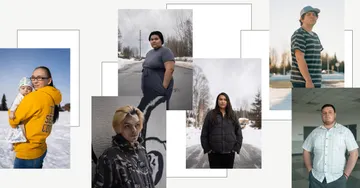This article was published in collaboration with Vice.
Jeanette Popp’s daughter Nancy DePriest was murdered in 1988 in Austin, Texas, while working at a Pizza Hut. Weeks later, police arrested Christopher Ochoa and Richard Danziger. Ochoa confessed during an interrogation, pleaded guilty to murder, and was sentenced to life in prison. Danziger was convicted of rape.
More than a decade later, Popp learned that both men were innocent, and she decided to meet the man who was actually responsible.
I felt suicidal when my daughter died. I had a gun and tried to work the courage up, but then one day my sister slapped me and said, “Do you want to put our mother through what you’re going through?”
I couldn’t do that to her.
It was a high-profile case, and the public wanted results. Our family wanted results. I remember how at the trial, Richard Danziger would just stare at me; he was so adamant about his innocence. But why should I have believed him? I had no reason to doubt the police, the detectives, the district attorney. It never occurred to me to doubt the entire judicial system.
Twelve years later, I was at work when my brother-in-law called and told me to turn on the TV. There was the district attorney, announcing that they’d got the wrong people. It was such a shock that I just collapsed in a chair, thinking, Oh my God. I was absolutely livid that I had not been told this before it was on television. What the hell are they doing? I thought. The guy confessed. They got the right guys.
I argued over the phone with an assistant district attorney, and then I called the lawyers for Ochoa and Danziger. I think they expected me to give them hell, but I just wanted the truth.
I felt horrible, like I should have known all along that something wasn’t right. When there’s a wrongful conviction, the family of the victim is victimized again, because you’re going to go through the release and then another trial, and then you’re going to wonder: How could this happen?
I reached out to Ochoa, who was still in prison. I didn’t know what to say to him, except that I was sorry this had happened, and how bad I felt about his mother’s suffering, knowing — because mothers know — that he wasn’t capable of murder.
On the day of Ochoa’s release, I sat with his mother, holding her hand. When the judge released him, I stood up and stepped aside so she could get to her son. We all went out to dinner together. He had a great big T-bone steak that covered the whole plate. It was heartwarming to see him free and eating that food; you could tell he hadn’t had good food in a while. Eventually, I pulled him aside and I asked him why he confessed. He said that after so many hours in an interrogation room, with no water and no food, he broke.
Danziger was exonerated and released, too, but he had been beaten by other prisoners and suffered brain damage. I never met him. He now needs constant care, and is still serving his life sentence, in a way.
The actual murderer was a man named Achim Marino. He had undergone a religious awakening while in prison for a different crime and confessed to killing my daughter. Because I’d lost faith in the judicial system, I knew that this man was the only person who could tell me the real truth of what happened.
I traveled to the prison where he was housed, and we sat across a table from each other. He was kind of scary looking, with tattoos all over, and his eyes could tear through you. I asked him why he killed my daughter, and he said that the voices in his head told him that if he made a human sacrifice, the headaches and voices would go away.
I asked if they went away, and he said no. I asked if she had said anything, and he replied that she said only “Please don’t hurt me.” I asked if she fought, and he said no. He added that she didn’t see he was going to shoot her.
Then he looked in my eyes and said he was sorry. Do I believe that? I’m not sure.
He said he’d rather be executed than spend his life in a Texas prison. But I couldn’t support that. You have to understand: Mr. Marino has a mother. She’s not responsible for what he did, and taking her son away—what good is that? I told reporters, “I will not stain my daughter’s memory with that man’s blood.” To be honest, part of why I tried to spare him was selfishness; I can’t personally be a party to the taking human life.
I went on the court steps and told the public to call the district attorney on my behalf and ask them not to seek the death penalty. A week later, it was off the table. “I’m sorry,” I told Marino. “I’ll do everything I can to save your life.”
Achim Marino received a life sentence in 2002 — one of four he is serving simultaneously — for the 1988 murder of Nancy DePriest. He is incarcerated at the Robertson Unit, in Abilene, Texas.
